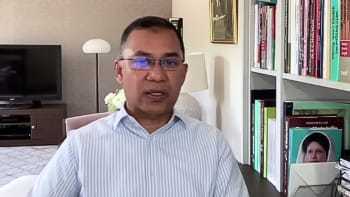Guideline on black fungus coming soon

As black fungus infections emerge as a new threat to public health in India, health officials in Dhaka yesterday said they will soon release a guideline on preventing and treating the infection.
Microbiologists and physicians say indiscriminate use of steroids and a few drugs are behind the black fungus infections among recovering and recovered Covid-19 patients.
"We are aware that black fungus infections have been detected in India's Maharashtra, Gujarat, Delhi and that a few states announced it as an epidemic. We are watching the situation carefully to make sure that it can't cause another disaster in our country," Nazmul Islam, director of Disease Control at the Directorate General of Health Services (DGHS), told a virtual press conference yesterday.
Black fungus, scientifically known as Mucormycosis, is a rare but deadly infection. It is being increasingly reported in parts of India in patients who have had the coronavirus.
The condition causes discolouration of the eyes and nose, blurred vision, chest pain and breathing difficulties. In some cases, doctors have had to remove one or both eyes, or part of the jaw to stop the disease from spreading.
People with diabetes, those who have taken steroids and humidified oxygen for a long time, and Covid-19 patients with a pre-existing comorbidity are the most at risk, experts said.
Different Indian states also ordered emergency measures to counter a surge in the rare infection among Covid-19 patients.
As per data available thus far, Indian media reports that mortality rate from black fungus infections is as high as 80 percent if a patient goes untreated, or remains untreated long. If treated, it is still 40-50 percent. In cases where the infection is caught at the sinus stage, patients mostly completely recover.
Mucormycetes are present throughout the environment, particularly in soil and in association with decaying organic matter, such as leaves, compost piles, and animal dung.
According to CDC, "Mucormycetes, the group of fungi that cause mucormycosis, are more common in soil than in air, and in summer and fall than in winter or spring. Most people come in contact with microscopic fungal spores every day, so it's probably impossible to completely avoid coming in contact with mucormycetes. These fungi aren't harmful to most people. However, for people who have weakened immune systems, breathing in mucormycete spores can cause an infection in the lungs or sinuses which can spread to other parts of the body."
No unusual black fungus infection has been reported in Bangladesh yet, officials said, adding that some precautionary measures should be taken nevertheless.
The Department of Microbiology and Immunology at the Bangabandhu Sheikh Mujib Medical University (BSMMU) has one of the country's top laboratories, testing numerous samples for different reasons.
No case of black fungus has been detected there in the last three months.
"The Birdem Hospital gets two or three cases of black fungus infection each month. It is normal. But we have to stay alert," Prof Ahmed Abu Saleh, chairman of the department, told The Daily Star.
Black fungus exists naturally in the environment, he said. "I do not think it will cause too much of a problem for us. But it turns out to be dangerous for immunocompromised people. We have to ensure that there is a stock of necessary drugs to treat it in case of an emergency."
Abu Zamil Faisal, member of the public health advisory committee of the DGHS, said the indiscriminate use of steroids to treat Covid-19 patients is making the people vulnerable.
"Physicians have not yet reported such cases. But as we have no strong surveillance system, we cannot dismiss the threat. We have to stay alert," he told The Daily Star yesterday.
"Black Fungus is affecting Covid-19 patients more due to prolonged administration of steroids and certain other drugs. Patients should not use steroids outside of the hospitals.
"We are discussing the issue. We hope there will be a guideline on black fungus soon."
Both the experts stressed on maintaining proper hygiene at the hospitals to prevent black fungus infections.
At yesterday's press conference, Dr Nazmul also said different health bodies of the government have been discussing the issue.
"The National Technical Advisory Committee on Covid-19 has been preparing a set of recommendations while the Public Health Advisory Committee [at the DGHS] is also working to set a prevention protocol. A prevention and treatment protocol on black fungus infection will be out soon," he added.

 For all latest news, follow The Daily Star's Google News channel.
For all latest news, follow The Daily Star's Google News channel. 



Comments